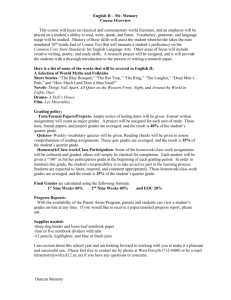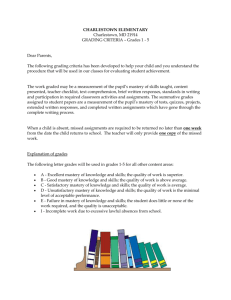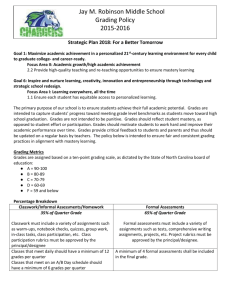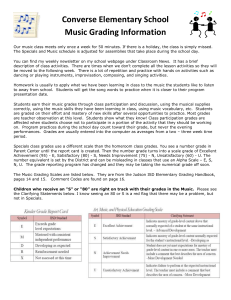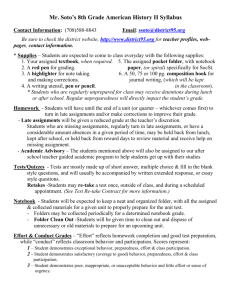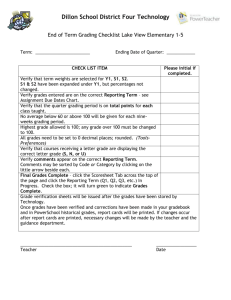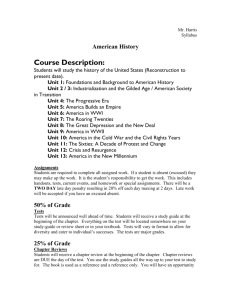WHA_Middle_Grading_Policy
advertisement
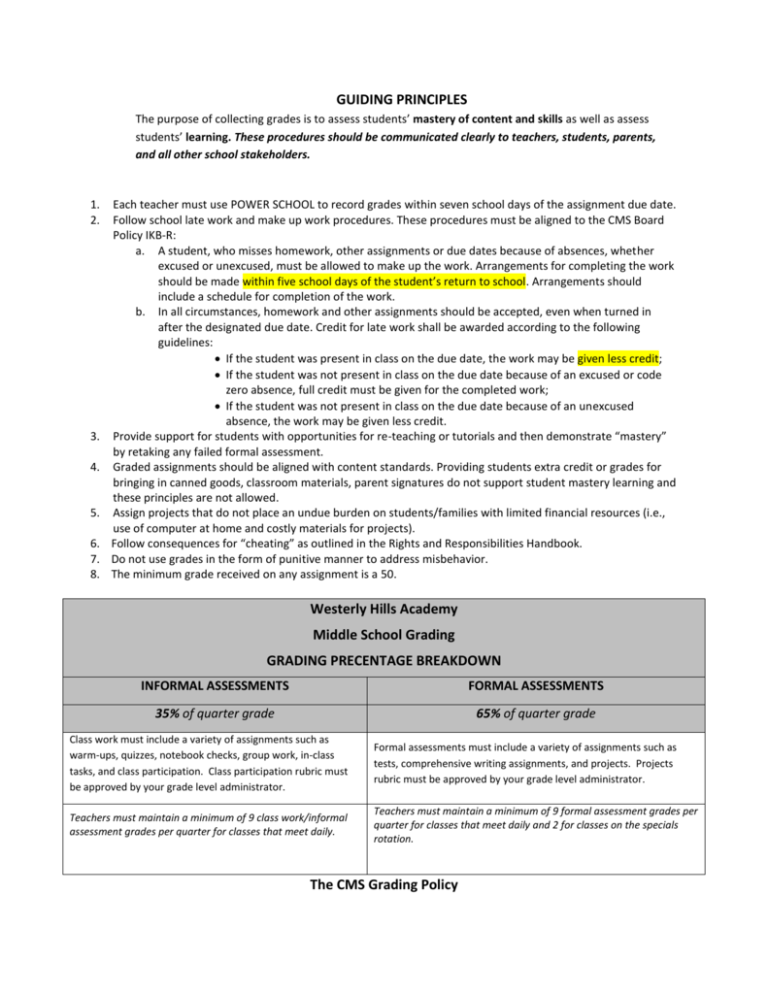
GUIDING PRINCIPLES The purpose of collecting grades is to assess students’ mastery of content and skills as well as assess students’ learning. These procedures should be communicated clearly to teachers, students, parents, and all other school stakeholders. 1. 2. 3. 4. 5. 6. 7. 8. Each teacher must use POWER SCHOOL to record grades within seven school days of the assignment due date. Follow school late work and make up work procedures. These procedures must be aligned to the CMS Board Policy IKB-R: a. A student, who misses homework, other assignments or due dates because of absences, whether excused or unexcused, must be allowed to make up the work. Arrangements for completing the work should be made within five school days of the student’s return to school. Arrangements should include a schedule for completion of the work. b. In all circumstances, homework and other assignments should be accepted, even when turned in after the designated due date. Credit for late work shall be awarded according to the following guidelines: If the student was present in class on the due date, the work may be given less credit; If the student was not present in class on the due date because of an excused or code zero absence, full credit must be given for the completed work; If the student was not present in class on the due date because of an unexcused absence, the work may be given less credit. Provide support for students with opportunities for re-teaching or tutorials and then demonstrate “mastery” by retaking any failed formal assessment. Graded assignments should be aligned with content standards. Providing students extra credit or grades for bringing in canned goods, classroom materials, parent signatures do not support student mastery learning and these principles are not allowed. Assign projects that do not place an undue burden on students/families with limited financial resources (i.e., use of computer at home and costly materials for projects). Follow consequences for “cheating” as outlined in the Rights and Responsibilities Handbook. Do not use grades in the form of punitive manner to address misbehavior. The minimum grade received on any assignment is a 50. Westerly Hills Academy Middle School Grading GRADING PRECENTAGE BREAKDOWN INFORMAL ASSESSMENTS FORMAL ASSESSMENTS 35% of quarter grade 65% of quarter grade Class work must include a variety of assignments such as warm-ups, quizzes, notebook checks, group work, in-class tasks, and class participation. Class participation rubric must be approved by your grade level administrator. Formal assessments must include a variety of assignments such as tests, comprehensive writing assignments, and projects. Projects rubric must be approved by your grade level administrator. Teachers must maintain a minimum of 9 class work/informal assessment grades per quarter for classes that meet daily. Teachers must maintain a minimum of 9 formal assessment grades per quarter for classes that meet daily and 2 for classes on the specials rotation. The CMS Grading Policy Sixth, Seventh and Eighth Grades A = 93-100 Excellent Performance B = 85-92 Very Good Performance C = 77-84 Satisfactory Performance D = 70-76 Low Performance F = Below 70 Unsatisfactory Performance Grading Grade books are instruments of legal public records and grades reflect a child’s ability to do the work. Under the Family Educational Rights and Privacy Act (FERPA), every student has the right to know his/her grades. Students who are on an IEP should not be given failing grades without proper interventions and documentation. Grades are to be recorded in the grade book for each subject area to substantiate the grade given on students' report cards. A date that the grade was given should be indicated as well as a description of the skill/ assignment. Please note that there should be at least 18 grades per quarter (2 per week) in reading and mathematics, and at least nine grades per quarter (1 per week) in writing, science and social studies for each report card grade given. Grades should be posted each week for parental access through Power School. Grades should only be modified for students that have a student assisted plan. Teachers must following the guiding principles from the district policy. A. Homework Homework is an essential part of learning. Teachers should use homework to offer students practice on recently learned content, preparation for new content that will be learned in future class sessions. Westerly Hills Academy recognizes that homework for daily practice and preparation is best used as a formative assessment to give students feedback on their learning and to inform instruction. It is not intended to be a summative assessment of mastery. Homework for practice or preparation may include but is not limited to the following: A. practice of taught skills B. introduction of a new skill C. reading to prepare for class work D. drafting or revising a composition E. preparing for a performance F. generating ideas for a discussion All homework assignments will be averaged and calculated for a final grade. Homework for elaboration (as it relates to completion of a larger assignment) may be a part of a daily or major class grade and can be assessed as a summative grade for mastery. In this case students may be expected to complete assignments or projects at home which apply skills and knowledge of a topic that has been taught and assessed in class. B. Failing to Submit Graded Work Students are expected to turn work in on assigned due dates for grading purposes. Work that is not turned in on the due date will be given reduction in points. Teachers/Schools will determine a final deadline to accept all work before the grading period ends. If no work is received on or before the final deadline date, the grade will be a fifty percent (50%). C. Submitting Late Work Teachers may penalize work that is submitted after the initial due date. Late work penalties may be awarded a reduction of 7 points on a daily basis for each day the assignment is late. D. Submitting Make-Up Work When a student misses a graded assignment due to sickness, a school-based event, suspension or any other excused or approved absence, the student will be allowed to make up the work with no late penalty. At a minimum, the student will be given the total number of days he/she was absent plus one additional day to make up the assignment for full credit. It is the student’s responsibility to communicate with his/her teacher regarding make-up work. E. Progress Reports 6-8 Progress Reports are sent home to parents when the child is performing below grade level in an academic area. Progress Reports provide notice to parents as it pertains to the performance of his or her child. If a child receives an average grade of ‘D’ or ‘F’ (6th through 8th) in a subject area, a Progress Report form should be sent home with the child to set up a conference with the parents/guardians.

